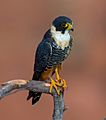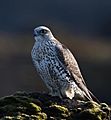Falcon facts for kids
Quick facts for kids FalconTemporal range: Late Miocene to present
|
|
|---|---|
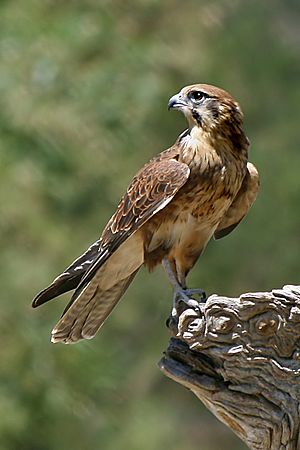 |
|
| Brown falcon (Falco berigora) in Victoria, Australia | |
| Scientific classification |
|
| Kingdom: | Animalia |
| Phylum: | Chordata |
| Class: | Aves |
| Order: | Falconiformes |
| Family: | Falconidae |
| Subfamily: | Falconinae |
| Genus: | Falco Linnaeus, 1758 |
| Type species | |
| Falco subbuteo (Eurasian hobby) Linnaeus, 1758
|
|
| Species | |
|
38; see text. |
|
Falcons are amazing birds of prey! They are like smaller cousins to hawks and eagles. You can spot them by their pointed wings and long tails.
For hundreds of years, people have worked with falcons in a practice called falconry. This is when people train these birds to hunt for them. Long ago, it helped people find food. Today, it's mostly a sport or hobby.
Contents
What are Falcons?
Falcons belong to a group of birds called Falco. This group was first named in 1758 by a Swedish scientist, Carl Linnaeus. The name Falco comes from a Latin word meaning "sickle," which describes the shape of the falcon's sharp claws.
Adult falcons have thin, pointed wings. These wings help them fly super fast and change direction quickly in the air. Young falcons, who are still learning to fly, have longer feathers. This makes it easier for them to learn the amazing hunting skills they'll need as adults.
Most falcons have dark gray or brown backs and wings. Their undersides are usually white. Falcons are special because they use a small "tooth" on the side of their beak to kill their prey. This is different from hawks and eagles, who use their strong feet.
The biggest falcon is the gyrfalcon, which can be up to 65 centimeters (about 2 feet) long. The smallest is the Pygmy falcon, only about 20 centimeters (8 inches) long. Female falcons are usually bigger than males. This helps them hunt a wider variety of animals.
Some smaller falcons with long, narrow wings are called "hobbies." Others, who can stay still in the air while hunting, are called "kestrels."
Scientists believe falcons have been around for at least 10 million years. They are not closely related to other birds of prey. Instead, their closest relatives are actually parrots and songbirds!
Amazing Vision and Speed
How Fast Can a Falcon Fly?
Falcons have incredibly sharp eyesight, much better than humans. One type of falcon can see 2.6 times better than a person!
Peregrine falcons are known for being the fastest animals on Earth. They can dive at speeds of 320 km/h (200 mi/h). The fastest recorded dive was an incredible 390 km/h (240 mi/h)!
Where Falcons Live
The peregrine falcon lives almost everywhere in the world, except Antarctica. They are famous for hunting other birds by diving on them at high speeds. Sadly, these falcons almost disappeared in North America because of pesticides. But thankfully, they have made a great comeback!
Falcons live on all continents except Antarctica. There are about 40 different kinds of falcons in the Falco group.
What Falcons Eat
Most falcons hunt small mammals using their excellent eyesight. Some falcons also hunt other birds, catching them right in the air!
Falcon Food Storage
On a Moroccan island called Mogador, falcons have been seen doing something very unusual. They seem to trap small birds in cracks in rocks. It looks like they are saving them to eat later!
Mogador Island is now a nature reserve. Eleonora’s falcons nest among the old ruins there. They hunt migrating birds like warblers and hoopoes. Researchers found small birds trapped in deep holes, unable to move their wings or legs.
Eleonora’s falcons have been known to store up to 20 dead birds during migration season when there's lots of food. But keeping live "snacks" might be a unique behavior for these clever birds!
Types of Falcons
Scientists group falcons into a few main types:
- Kestrels: These are usually small and strong falcons. They are mostly brown on top. Kestrels mainly eat small land animals like rodents, reptiles, or insects.
- Hobbies: These falcons are a bit larger. They often have dark gray feathers and black marks on their cheeks. Hobbies mostly hunt smaller birds.
- Peregrine Falcons and Relatives: This group includes the very fast peregrine falcon. They also have black cheek marks and often a black cap on their heads. They are usually medium gray with lighter or brownish colors. These large falcons hunt medium-sized birds and land animals.
- Hierofalcons: These falcons look a bit like hawks, with reddish or brown colors and strong patterns on their feathers. Their undersides have blotches or lines.
Species of Falcons
Here are some of the different kinds of falcons:
| Image | Common name | Scientific name | Where they live |
|---|---|---|---|
 |
Malagasy kestrel | Falco newtoni | Madagascar, Mayotte, and the Comores. |
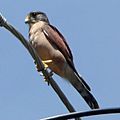 |
Seychelles kestrel | Falco araeus | Seychelles Islands |
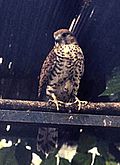 |
Mauritius kestrel | Falco punctatus | Mauritius |
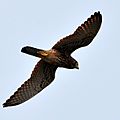 |
Spotted kestrel | Falco moluccensis | Wallacea and Java |
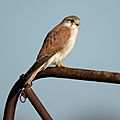 |
Nankeen kestrel or Australian kestrel | Falco cenchroides | Australia and New Guinea |
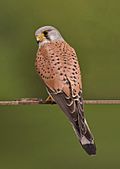 |
Common kestrel | Falco tinnunculus | Widespread in Europe, Asia, and Africa. |
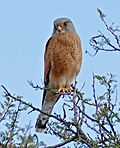 |
Rock kestrel | Falco rupicolus | Southern Africa. |
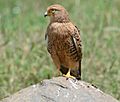 |
Greater kestrel | Falco rupicoloides | Southern Africa. |
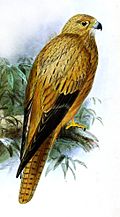 |
Fox kestrel | Falco alopex | South of the Sahara in Africa. |
 |
Lesser kestrel | Falco naumanni | Afghanistan, Central Asia, China, and Mongolia. |
 |
Grey kestrel | Falco ardosiaceus | Eastern and Western Africa. |
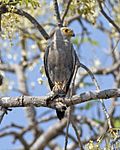 |
Dickinson's kestrel | Falco dickinsoni | Southern Africa. |
 |
Banded kestrel | Falco zoniventris | Madagascar |
 |
Red-necked falcon | Falco chicquera | Africa, India |
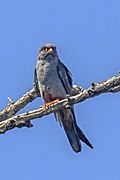 |
Red-footed falcon | Falco vespertinus | Southern Russia and Ukraine. |
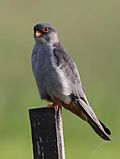 |
Amur falcon | Falco amurensis | South-eastern Siberia and Northern China. |
 |
Eleonora's falcon | Falco eleonorae | Mediterranean islands and coasts. |
 |
Sooty falcon | Falco concolor | Northeastern Africa to the Persian Gulf. |
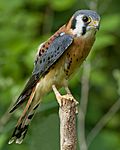 |
American kestrel or "sparrow hawk" | Falco sparverius | North and Central America, and the Caribbean. |
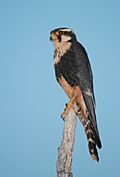 |
Aplomado falcon | Falco femoralis | Mexico to Southern South America. |
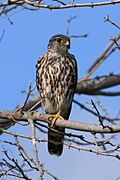 |
Merlin or "pigeon hawk" | Falco columbarius | Eurasia, North Africa, North America. |
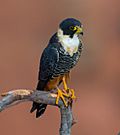 |
Bat falcon | Falco rufigularis | Tropical Mexico, Central and South America. |
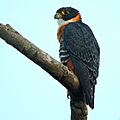 |
Orange-breasted falcon | Falco deiroleucus | Southern Mexico to Northern Argentina. |
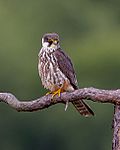 |
Eurasian hobby | Falco subbuteo | Africa, Europe and Asia. |
 |
African hobby | Falco cuvierii | Across much of Africa. |
 |
Oriental hobby | Falco severus | Eastern Himalayas to Australasia. |
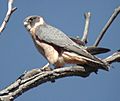 |
Australian hobby or little falcon | Falco longipennis | Australia. |
 |
New Zealand falcon or Ngarangi or kārearea | Falco novaeseelandiae | New Zealand. |
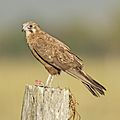 |
Brown falcon | Falco berigora | Australia and New Guinea. |
 |
Grey falcon | Falco hypoleucos | Australia. |
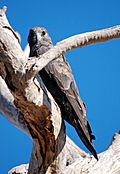 |
Black falcon | Falco subniger | Australia. |
 |
Lanner falcon | Falco biarmicus | Africa, Southeast Europe and parts of Asia. |
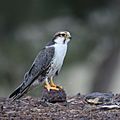 |
Laggar falcon | Falco jugger | Southern Asia. |
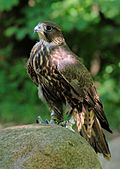 |
Saker falcon | Falco cherrug | Ethiopia, Arabian peninsula, Northern Pakistan, Western China. |
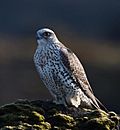 |
Gyrfalcon | Falco rusticolus | Arctic regions like Greenland, Canada, Alaska, Iceland, and Norway. |
 |
Prairie falcon | Falco mexicanus | Western North America. |
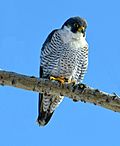 |
Peregrine falcon | Falco peregrinus | Found almost everywhere in the world. |
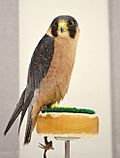 |
Taita falcon | Falco fasciinucha | Kenya. |
Falcons That Are No Longer Alive
Some falcon species have become extinct (died out) over time. One example is the Réunion kestrel, which disappeared around the year 1700.
Scientists also find fossils of ancient falcons. These fossils help us learn about falcons that lived millions of years ago.
Images for kids
See also
 In Spanish: Falco para niños
In Spanish: Falco para niños
 | Madam C. J. Walker |
 | Janet Emerson Bashen |
 | Annie Turnbo Malone |
 | Maggie L. Walker |












